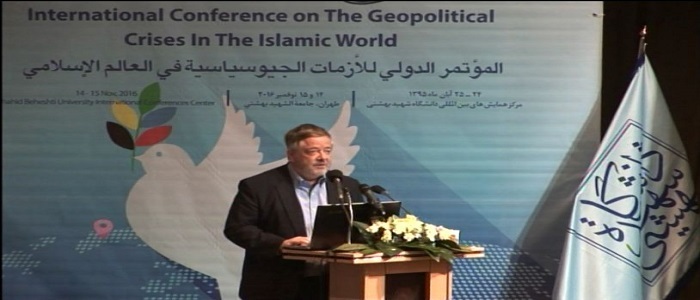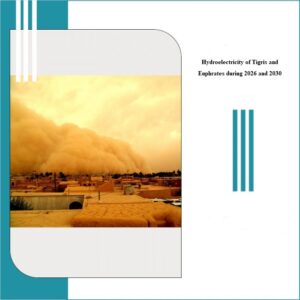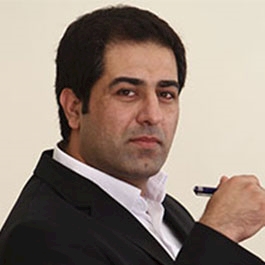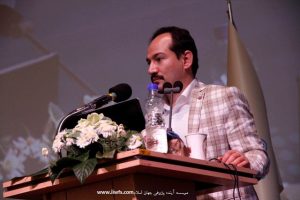“African Salafism”
Speech by:
Dr. Roland Marchal
International Conference on the Geopolitical Crises in the Islamic World
Institute for Islamic World Futures Studies
15 November 2016
Good morning to all of you. I would like first of all to thank the organizer for this wonderful invitation and the warm hospitality they provided us and I would like to talk maybe a bit against the current trend here and the discussion of yesterday and maybe propose you some sort on African Salafism.
Now even though Africa is not so well known here in Iran; certainly there are several instances by which Salafism in Africa is got defined on label. Of course people mentioned quickly yesterday the conflict in Somalia with the resilience of Harakat al- Shabaab al-Mujahideen, the war in Mali with al- Qaeda in the Islamic Maghreb, Boko Harram in Nigeria, and in Cameroon, in Chad, in Niger. Of course the first thing I want to say is this blanket equation between Salafism and militancy is highly inaccurate and tell us more about our own ignorance than about the variety of Salafi representations in Africa. Now of course, defining Salafism is something that is actually much more difficult than many people think. There is an empirical phenomenon, there is an analytical concept and though it’s not place here to go into that into the test but I believe we could just remind us that the Salafism will be considered as religious current devoted to secure doctrine on ritual purity, guarding the monopolistic principles of Tohid against bid’ah particularly pilgrimage to shrines, tombs and practices connected to Sufism.
Another important aspect is underscoring of Islam scriptural tradition seeing as the only legitimate source of Islam and which is approach in highly literalist manner. Of course the more modern representation is often Abdul Wahhabism that has been discussed yesterday and of course this foremost will start with the establishment of the Kingdom of Saudi Arabia in 1932 and of course get quite much stantial dynamic in 1960s with the establishment of the Muslim world league or the Islamic University of Medina in 1961. Now there are many ambiguities. One of them is the fact that there is another trend which as well was quoted at least by orientalists and certainly by French orientalists as well as Salafia which is linked to Jamal al-din Al- Afghani or al-Irani should I say sometimes, Muhamad Abduh and Rashid Rida. This trend which basically provided the pillars for Muslim brotherhood ideology is often called Egyptian Salafia but it’s connected in a way and it’s very different on another in the sense that this movement, this trend was mostly related to relating Islamic virtues to the modern and to discuss the relation between Islam and Western influence more than religious purity. And of course this broad, a number of confusion sometimes in our discussion.
Now if I talk about African Salafism, it’s in a context by which this African Salafism is not defined as essentially Africans. We should again understand that there is a trend both in the perception of other Muslim communities maybe in Iran but certainly in the Arab world to consider that African Islam is first of all African; and therefore is a particular cult or particular race cult which is actually distinctive from the Islamic tradition. This is actually quite untrue; and of course Salafism in Africa is defined both as own-grown phenomenon as well as it is constantly produced redefined thorough complex dialogues between broader unlocal this process. I will come to that with some examples in one moment. Another perception has to be challenged. There is one perception that the Arabs introduce Salafism upon largely perceived Africans. This is again a perception that is framed in 2 certain colonial vision of African Islam by which Africans just can receive perceivably whatever ideology is provided to them, whatever western democracy or in this case Islamism or Salafism. Now we have many examples in history that proves that actually Salafi ideas came actually much earlier of the time Saudi Arabia was established. There are for instance many studies on the Jihad in the Sahel in the 18 and 19 centuries. There are studies on certain Sufi orders like Tijaniyyah or Salahia in different countries that prove that many structural elements of Salafism were actually present. We have as well the works, important works of sheikhs in East Africa such as Sheikh Ali Al’amin Mazrui who played a very important role for the education of the Muslim community and who clearly has raised from connection with Salafism. This Salafism being sometimes very much concerned with religious purities, sometimes more connected to what today we would call the Muslim Brotherhood ideology.
Now of course if I say that, it’s not to deny the importance of trans local developments due to Hajj, to the development of other religious learning institution in Saudi Arabia in 1960s and of course to the training of young sheikhs who came from Africa and then got educated in Saudi Arabia and came back. Often those people are called ironically by the Muslim community the new ulama. There is the proof of that sense of difference.
Islamic NGOs as well used to play a very important role to support this trend as it was mentioned yesterday afternoon, but again we have to be aware of the limitations of those NGOs. They are mostly networks of finance diffusions of literature oddly missionaries; therefore, we have to understand that Africans still play a defining role as agent of religious change on the continent. Now, there is one peculiarity that should have a much broader and deeper discussion, certainly the connection with certain social groups in Africa. One of them being the Muslim merchants and again we have to go back to history to understand that. in the colonial period, the emergence of new commercially needs actually made up of younger generation was mobility was blocked by more traditionally needs. Therefore, adherence to Salafism was a way of distinction from those traditionally needs as well as a common flag to gather, to gain some social importance, for instance in Mali, long before the current crisis, being Salafi was certainly one of the criteria to be part of the merchant class or the elite merchant class. The same should be said on the fact that those groups who are committed to Salafism help much in providing resources to build new Islamic institution and as well provided social capital to convince people to either accept this new trend or to join the new trend.
If we look Nigeria, so the most populated sectarian country, the Salafi organization the greatest religious movement today in Nigeria, Izala was actually structured in late 50s through a committee of patrons that gather wealthy business men who provided financial support to the movement. The same could be said for a country I know much better, Somalia. Now another point in the discussion is of course as I said those new ulama played an important role but it is an assumption that should be discussed; that those new ulama brought just a copy of the Saudi Arabian Salafism they studied. They had actually a certain degree of ideological independence on what I would consider or name here a certain Salafi eclectism which is of course something not so surprising when we see the current developments. Now the quest for religious purity as I said as been certainly a defining factor of African Salafism. It is absolutely not a new phenomenon. If we look again the Jihad, you know referring to what happened to Sudan after 1883 or in Somalia in early 1900s, we had groups sometimes Sufi order, sometimes new what we call neo-tariqa who actually promoted those Ideas in Nigeria sheikh, the greatest sheikh that led the movement, or advised the movement I mentioned earlier, sheikh Abubakr Gumi actually made fatwa saying that joining a Sufi order was irreconsible with being a Muslim; so of course these discussion or this antagonism against Sufi order manifested itself as well in another occasion, the hostility against the cult of Saints, the spirit cult Mowlid which is a so important celebration on African Mowlid al-Nabi celebrating the birth of Prophet and of course zikr.
Now what is certainly important and what we witness today is as well the fact that individuality has been related to a multifaceted process of modernization and very much defined against what was defined by negative western influence. It happens in other religious or in other school of Islam but certainly what we witness is new generation of Salafie’s place much attention on combating smoking, drinking alcohol, listening to modern music, watching TV, or focusing on outward appearance such as growing beard -I’m trying my best but I’m not very successful-, wearing trousers about the ankle for men or covering face for women.
Now, contrary to maybe perception from outside, all those practices or recommendations actually brought about new divisions within the Salafi movement. Certain sheikhs, Salafi Sheikhs consider lacks or compromising which of course you know they declared in the other ways and largely the younger generation as well is trained to generate more splits, more differences because it generates as well more space for them. And so we have to understand that to a certain extent the growth of Salafism might represent as well the growth of individualism in the way individuals wants to direct their own understanding of religion, and of Islam.
Now there is no doubt, this was said so many times yesterday that this Salafi excusism has very much affected the markation of boundaries between true and untrue, quote unquote believers and produce much more polarized Muslim societies. On certain occasions they have been violent attacks on Sufi Shewings practitioners but in most cases the conflict has taken the form of uncompromising and very polemic da’wah. Of course as well it has been mentioned yesterday the most outer expression of Salafi excusism is related to the practice of Takfir.
Now Takfir is not new, it’s not something that came in the 20th century but of course the way it is used or practiced has become much more political, much more privatized than it used to be in the past. Major figure of the Nigerian Salafi movement, for instance the cleric of BokoHarram made the same statement against them and killed 6 very important Salafi sheikhs. But again if we look this specific landscape, what is important to notice is that Takfir was a common practice during or throughout the Jihad led by ottoman then and during the 18 century. Now I have mentioned that but I should have maybe spent more time talking about the accommodation, in Ghana for instance Niger, the Salafi movement is actually much more compromising than the picture you may have after listening the presentation of yesterday. Takfir is absolutely not accepted, even in Somalia today, is not accepted by the core Salafi community. To the extent that those promoting Takfir are seen as Khiwarej. Now I could have talked about the politisation of religious purity and of course crisis such as Nigeria, Mali and Somalia. The point I want to make is a point westerners intend to forget too often is, first of all when we look those movements, we forget that they kill mostly Muslims and actually in Nigeria and Somalia they killed a quite significant number of Salafi thinkers or practitioners. So the discussion, debate, the contradiction is within their own community as well as within the Muslim community.
If I have to conclude let me say just two points which I expect you may remember. African Salafism is African in the sense that it has been introduced by Africans, has been shared by African realities, and shaping the same realities. Of course this African Salafism does not exist in isolation from other representation of Salafism. It constantly remains in dialogue with broader ideological discourses, is affected by various ideological currents. It is then globalized by the same token as it’s African.
Now based on demonstrating the variety of African Salafism, certain Salafi movement have moved from initial exclusivist and uncompromising views toward the often Sufi adversaries to more accommodating and compromising attitude. They should serve as a powerful remainder of not treating Salafism as following an inevitable linear trajectory. This means that one should see its quest for purity as inevitably move to a direction of increased quote unquote radicalization where militancy and violence become the final and unavoidable outcome. Salafism like any religious or social movement is a product of human agency and in the same way as African nation were fundamental for the introduction and spread of Salafism, they will also be the ones determining and shaping its future development.





